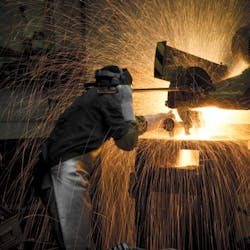But there is good news, says Bill Gaskin, president of the Precision Metalforming Association (PMA, www.pma.org), Independence, Ohio. "Things are a whole lot better. But very few companies are back to their peak of 2007 or 2008," he says.But PMA, which represents the multi-billion-dollar North American metalforming industry, found that in June 2009, the general industry average for booked orders rose above the 12-month rolling average. "For our industry, that's when the recovery began," Gaskin says. Now, with 16 consecutive months of orders, that's "a pretty good recovery"—not as good as PMA would like, nor fast enough. But "it's still substantial," he adds.Metalforming's employment bottomed in April 2009, with 85 percent of its members placing employees on short time or laying them off. At the beginning of fourth quarter 2010, it was 17 percent, Gaskin reveals. He suspects that figure ignores companies' workforce shrinkage, and "guesstimates" that 33 percent or more of PMA's members "just may be smaller." He's certain that the shrinkage represents "structural unemployment," however."It's significant" and "not done yet, especially in a tight credit market. It's hard to raise the cash you need to buy the raw materials and hire people," Gaskin observes. Margins are compressed because "there's still a level of competitiveness that makes it hard to get price increases." Companies doing well now are those that adjusted quickly in 2009 and got lean very quickly, and remain "cautious" about hiring and adding cost, he notes.Uncertainty weakens growth"Uncertainty of taxes, regulatory environments and even strength of recovery impact investing and hiring," Gaskin says. Calling Washington's political situation "grave," he says that legislators' uncooperativeness in addressing the United States' economic ills and their failure to assemble a manufacturing strategy is a "travesty." Further, he believes that the federal Affordable Healthcare Act of 2010, "is not good for manufacturing as it exists now." Neither are current estate and income taxes, he adds, because "many [members'] companies are Subchapter S and LLC [limited liability corporations]."What would Gaskin have the government do? First, "it's got to make America the best place in the world to make things." Next, "we've got to continue to be a great place for companies to headquartered." Those companies generate demand that smaller companies need and can meet. Further, he believes the government must end taxes on repatriated earnings from U.S.-based companies' foreign subsidiaries. "When GM or Ford makes cars in Germany, when they repatriate those monies to headquarters in America, they pay taxes on them. But they've already paid taxes in Germany." That double taxation penalizes the United States, he asserts.Finally, "we've got to be the best place in the world to innovate," Gaskin declares. "We assume innovation will drive higher-value products to be made here. But it's very unlikely if innovation occurs elsewhere."Brighter news comes through early-October data showing two of three PMA members—about 1,000 total, of which half are manufacturers and essentially all small businesses—believe that 2010's fourth quarter will be at least the same as the previous quarter, or that business will increase.While he believes that continued growth will happen, "the recovery isn't fast enough." So if Gaskin could wave a magic wand and immediately change anything, what would it be? "We need a stable business environment so we can grow our companies." Perhaps the government will listen to Gaskin's suggestions for spurring growth and accelerating recovery? That would be newsworthy.C. Kenna Amos, [email protected], is an Automation World Contributing Editor.Precision Metalforming Association, PMA
www.pma.org
www.pma.org
Subscribe to Automation World's RSS Feeds for Columns & Departments
About the Author
C. Kenna Amos
Contributing Editor
Sign up for our eNewsletters
Get the latest news and updates

Leaders relevant to this article:
